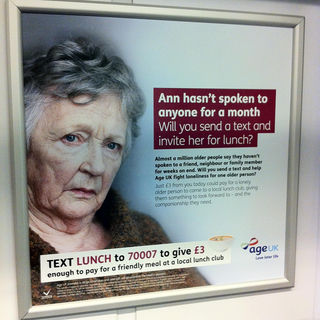Loneliness
We Need a National Anti-Loneliness Campaign for the Holidays
It's holiday time: Do you know where the lonely people are?
Posted November 23, 2015
The holidays can be an acutely lonely time of year for millions of people. When everyone around you is surrounded by family and friends enjoying each other’s company and sharing togetherness, being alone can feel absolutely excruciating.
And yet, millions of people are alone during the holidays, as they have nowhere to go, no one to visit them, no one who calls, and no one who cares. Loneliness is not just emotionally painful it is extremely damaging to our physical health as well (read Ten Surprising Facts about Loneliness) and is directly related to increased risk for cardiovascular disease, depression, and even, early death.
The question is who should do something about it?

Last year I was visiting London in December where I saw this anti-loneliness campaign ad on a train. Age UK, who ran the ad campaign, as well as The Campaign to End Loneliness, are examples of organizations fighting to bring awareness to the problem of loneliness, especially among the isolated elderly, and to institute community based programs to combat it.
I live in New York City where tens of thousands of people are alone for Thanksgiving and the holidays and I have not seen a single ad bringing awareness to the problem of loneliness, nor have I seen ads urging people to reach out to neighbors, colleagues, or anyone who might be alone and lonely.
Loneliness is a problem that is by no means isolated to the elderly. A recent study in the U.K. found that loneliness was an even greater problem among the young, as one in ten people reported having no real friends.
A Three Pronged Solution to the Epidemic of Loneliness
Loneliness is a problem experienced by individuals but it can only truly be solved by communities. We no longer live in hunter gatherer societies where all clan members live together and are in touch with one another at all times. We live in rural communities where people are geographically distant from one another or in big cities where it is easy to be unnoticed and forgotten even in death, as was so poignantly illustrated in this New York Times article, The Lonely Death of George Bell.
To address the issue we need to consider large scale interventions covering the following areas:
1. Awareness: Much like Age UK’s national ad campaign, we need to raise awareness for the epidemic of loneliness and remind people to reach out to those around them who might be lonely.
2. Outreach: We need initiatives and mechanisms that can reach people who are isolated, whether because of age, disability, or any other reason, in order to offer services and support.
3. Interventions: We need programs that can utilize local resources to educate lonely people, connect them with people in their areas, and integrate them into the larger fabric of their communities.
Bringing Awareness to Loneliness and Taking Action
Until we have the right programs in place, it is up to us, ordinary citizens, to create awareness for the terrible problem of loneliness in our society and to take action in any way we can. Here's what you can do:
1. Reach out to someone who might be at risk for loneliness this holiday season.
2. Make an effort to visit an elderly neighbor, someone who just moved to the neighborhood and might not know many people, or a single parent who might be starved for the company of another adult.
3. Discuss loneliness with your children. Ask who in their school tends to be isolated and without friends, and encourage them to reach out to that kid and put a smile on their face.
4. Seek volunteer opportunities and make a difference in at least one person’s life.
At a time of year that celebrates family, community, and connection—let’s do what we can to ease the disconnection and isolation plaguing millions of people around us and causing acute emotional pain. Let’s do what we can to make sure the holidays are happy for everyone.
Check out the chapter on loneliness in my book, Emotional First Aid: Healing Rejection, Guilt, Failure and Other Everyday Hurts (Plume, 2014).
Watch my TED Talk and hear about my own experience with loneliness.
Like The Squeaky Wheel Blog Facebook Page, post questions or comments about this article and I will answer them.
Also, join my email list and receive an exclusive gift article—How to Recover from Rejection.
Visit my website at guywinch.com and follow me on Twitter @GuyWinch
Copyright 2015 Guy Winch
Images by freedigitalphotos.net




